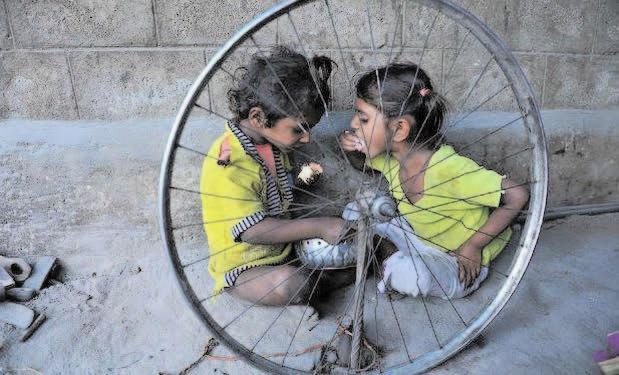
THE National Food Security Bill, just passed by the Rajya Sabha, constitutes a shift from the welfarebased approach to a rights-based approach. It gives a ground to the right holder to claim a defined quantity of food as his legal entitlement, and in case of denial, take recourse to courts for its enforcement. This makes India probably the only country to recognise that ensuring food security to citizens is not only moral and ethical but also a legal imperative as well. The Bill has generated a vociferous debate amongst political classes, economists and industrialists.
The debate has raised certain valid concerns which need to be addressed to make the right effective such as restructuring of the Public Distribution System (PDS), identifying genuinely those for whom the law is meant and putting measures for ensuring proper and adequate funding with an effective monitoring of the system. In this regard the advocates of the Bill may draw lessons from Tamil Nadu, Andhra Pradesh and Himachal Pradesh, which have been quite efficient in running the PDS, as also from states like Chhattisgarh, Bihar and Orissa, which have seen an enhanced percentage of the population accessing cereals from the PDS along with a reduction in leakages. These states have achieved these results by largely using simple technological fixes such as computerisation, doorstep delivery and a global positioning system to track foodgrain movement and improve transparency in the system. Experience of these states can help in dispelling the notion that the food security proposal is impracticable.
However, some of the arguments against the move are weak and misplaced. An argument especially made in political circles is about the timing and intention of the government in introducing the Bill after dithering or choosing to wait after four years of promising it. The introduction of the Bill at this stage is seen as a ‘game-changer’ for reaping electoral fortunes and for hoodwinking people and diverting public attention from inconvenient issues. Even if these arguments are assumed valid the question that remains is about their relevance in the working of democratic politics. It is undisputed that winning power is an integral aspect of democratic politics. The fundamental question is what vision, policy choices and priorities and how convincingly does a political party incorporate them in its pursuit for winning power. A piece of legislation that yields political capital can also be pro-people.
MNREGA is an example that admittedly brought political dividend to the party and it simultaneously gave relief to a vast number of poor people. What matters is the political wisdom and acumen of a political party to assess how people would respond to its policy choices and the timing of its implementation. Another issue raised concerns the Bill’s financial burden. Some have described the Bill as a ‘nightmare’, while others as a ‘money-guzzling measure’. There may be some rationale behind these charges but a realistic assessment by many experts reveals an ‘exaggerated nature of these charges’. India at present spends about 0.9 per cent of its GDP on food subsidies. If the right to food as envisaged is accepted, the cost would rise to 1.25 per cent, entailing only an additional expenditure of 0.35 per cent of the GDP. Calling such a marginal enhancement a ‘nightmare’ or a ‘moneyguzzling’ step does not sound convincing, especially when India’s spending on social welfare entitlements is much lower than other countries in the South Asian region.
According to the latest report of the Asian Development Bank, India spends only half the average social protection expenditure (as a proportion of the GDP) of what the lower middle income countries in Asia spend. The report gives India a score of 0.051, below most of its South-Asian peers. Enhancing social spending by just 0.35 per cent of the GDP should not cause any nightmares. It is significant to note that almost every political party has extended its support, in principle, to the Bill but at the same time insisted on the acceptance of its amendments as a precondition for the passage of the Bill. These amendments range from proposing the enhancement of the quantity of food entitlement, offering subsidised pulses in addition to wheat and rice, extending the coverage of the Bill from 67 per cent as presently suggested to 75 per cent of the population and some even asking for a universal coverage. Keen to ensure the passage of the Bill, the government has accepted some of the proposed amendments, at least partially if not fully.
It is widely reported that the government is considering to undo a provision contained in the Ordinance that introduced a cut in the annual allocation of foodgrains in case of 18 states like Tamil Nadu which now will get extra grains (but at the existing APL rate of Rs. 8.30 a kg for rice and Rs.6.10 a kg for wheat). The move will cost an additional Rs 5,000 crore. It is obvious that such actions on the part of the government will put an additional burden on the treasury. What puzzles and hurts a common citizen who believes in and values the importance of parliamentary democracy is the doublespeak and a hypocritical position of various political parties. Should we describe such a development as ‘paradoxes of democracy’ (to sound charitable) or ‘vandalisation of democracy’? On the one side parties are vying with one another to demand that the government should take immediate and serious fiscal and economic decisions, removing policy paralysis to contain the rising fiscal deficient, food price inflation and the steep fall in rupee value; on the other, the same parties are proposing several amendments to the Bill as a precondition for its passage even if the acceptance of these amendments would put an ‘astronomical additional burden on the exchequer’. What is the ‘mystique’ behind parties taking such a ‘self-contradicting’ position? One does not need to guess too much.
The continuous disruption of Parliament sometimes creates doubts in the mind of the common public about motives of both sides in the game. The attitude of the government equally sounds baffling. While on the one hand we see the government announcing day in and day out one or the other measure claiming them to be aimed at checking the developing economic crisis, restoring the climate of confidence for investment, clearing long-pending mega projects that were hampering the cause of growth; on the other hand it displays a desire to compromise its own economic prudence and principles of effective governance by moving at least 10 amendments to the Bill that incorporate major suggestions of opposition parties and supporting its allies to get the Bill passed. Suggestions contained in most of these amendments were strongly rejected by the same government earlier. If the country is convinced that growth has to be ensured and that it has to be inclusive and that the same should have the common man’s face and that its fruits, instead of remaining confined to the few, must trickle down to the bottom, then the answer lies in striking a balance between growth and redistribution.





Be the first to comment